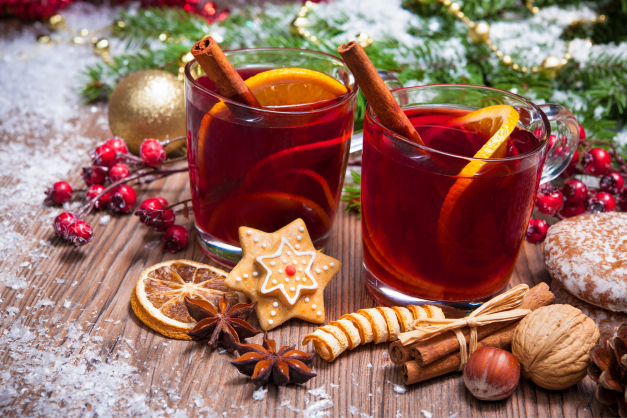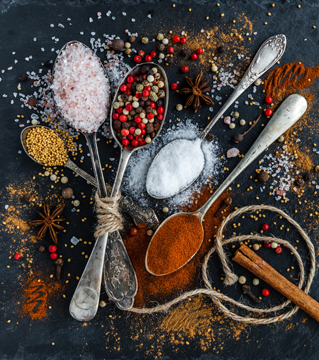Tips for Making Mulled Wine This Festive Season
Posted by Spice Zen on 2nd Dec 2021
With Christmas less than four Sundays away, it is time to set up the Christmas tree, hang up the stockings, and wrap up the presents. As you gear up to spend festive time with your family and loved ones, enjoy good food, gingerbread cookies and indulge in a warm Christmassy glass of mulled wine. You may be wondering how this classic spicy wine drink came about. While many of us enjoy mulled wine, few know where it came from or how it became popular.
Classic Mulled wine is a beverage of dry red wine, spices, sweetener, and fruity citrus. There are variations to this classic mulled wine with a different name in across the countries. It is known as Glühwein in Germany, Glögg in Scandinavia, vin Chaud in France or vin Brule in Italy.
History of Mulled Wine
In Ancient Greece and Rome, mulled wine was a tonic drink to warm the body during the cold seasons. Infusing the wine with spices helped maintain a pleasant flavour of off-flavour wine. Around 20 A.D., it was known as “Conditum Paradoxum within the Roman Empire. Romans made it by heating wine with spices (long pepper, laurel, saffron), dates and honey and topped it with better quality wine to protect against the harsh winters. Mulled wine became popular across Europe with extension of the Roman empire.
The Silk Road trade during the Roman Empire, led to the introduction of new spices like ginger, cardamom and fruits to give this drink their unique twist. Around the 12th century, many countries came up with variations of the traditional drink, especially in Spain and France. In the 13th century, mulled wine spread to England through the port of Lattes near Montpellier. King Henry III was quite fond of this beverage. It became popular in Germany and the Nordic countries around 1420.
In the 16th century, mulled wine gained immense prominence as it was safer to drink wine than water during the Black Death years. Around 1890, mulled wine became associated with Christmas and a staple drink in German Christmas markets as Gluhwein. Nordic Glogg took it to the next level by adding a shot of spirit to the mulled wine.
While different countries worldwide have various methods of making mulled wine, it remains a beloved beverage and has become synonymous with the Christmas.
Tips for a perfect Mulled Wine at home
Classic Mulled wine usually has four key ingredients – red wine, spices, sweetener and citrus. Often the store-bought mulled wines are either sickly sweet, too spicy, not spicy enough or just not for your palate! There is nothing like mulled wine made to suit your palate. Especially when it is so easy to make with Spice Zen’s Mulled Wine Spice Blend!
Spice Zen’s Mulled Wine Spice Blend is a traditional blend of premium certified organic mulled wine spices with a warming, sweet and fruity flavour. It makes a comforting and soothing alcoholic or non-alcoholic beverage to serve any time of the year. This blend celebrates traditional festive spices and makes for a thoughtful, gourmet gift idea. Like all our other products, the Mulled Wine spice blend is gluten-free with no preservatives, sweeteners, or added flavourings.
You can brew large batches for the festive season celebrations by following our simple recipe and enjoy the classic mulled wine with your friends and family. For a perfect mulled wine, here are some tips:
Wine choice
Dry wine, young, bright, mid-range, fruity reds that are easy to drink and ideally unoaked are the best choice for mulled wine. Good choices are pinot noir, merlot, syrah, cabernet sauvignon, or Montepulciano. If you are making for a large party, a box of wine will work perfectly and will be within budget.
If you are ramping up the cheer with spirit or liqueur – Cointreau, vodka, rum, sloe gin will work.
It is usual to enjoy White wine crisp and chilled, but you can mull it with light flavours like elderflower cordial, rosemary, vanilla and thyme. Mulled Rosé with crème de cassis is a great festive alternative. For non-red wine fans, mulled cider is a great option.
For non-alcoholic drinkers and kids, apple juice paired with cranberry, pomegranate, blackcurrant or grape juice works wonders. Try our mulled apple and grape juice mocktail.
Mulled wine spices
Cardamom, cloves, star anise, allspice, long pepper, ginger, orange peel are quintessentially Christmas spices. For a perfectly balanced mulled wine, the right proportion of the mulling spices is the key. Spice Zen’s Mulled Wine Spice Blend has and ideal balance of spices. The convenient muslin cotton bag removes the need to strain after mulling the wine.
Other Additions
Add sugar or other sweeteners sparingly to avoid making the mulled wine overly sweet. Demerara or soft brown sugar adds a fudgier flavour.
For citrus, a slice of orange or mandarin works well. Add finger lime for an Aussie native twist.
Mulling process
The wine needs to infuse with spices for the traditional Christmassy flavour, but boiling the wine with spices for a long time will result in a bitter taste. If you are directly infusing the wine, simmer it gently. Boiling of the wine will evaporate the alcohol in the wine and compromise its balance of flavour. We recommend making first a spiced syrup and then infusing it to the wine by gently simmering for 10 minutes and letting it sit for at least a couple of hours or overnight. The simmering temperature of the wine should be a maximum of 78°C/173°F. For mulling, use a heavy-bottom Dutch oven or a stainless-steel pot or even a slow cooker.
Serve your mulled wine steaming in a glass or porcelain mugs. Garnish it with a slice of orange, whole cinnamon stick, star anise, berries, sliced almonds, sultanas or our native Finger lime!
Food Pairing
Mulled wine pairs well with Blue cheese canapés, Stilton, Gorgonzola, aged Cheddar, cheese fondue, sweet mince pies, Christmas pudding cake, Gingerbread cookies, apricot & marzipan twist, ham sticks, pickled fish and crackers.
Add leftover mulled wine (if any!) to pork or red cabbage, steep pears or cranberries, or add it to fruit sauces and cakes.
Traditionally a warm mulled wine is sipped in front of the fire with hot food close to Christmas. But mulled wine is also fantastic when chilled, like Sangria. More so the chilled version is perfect for the Aussie Summer Christmas Barbeque! In Australia, we are lucky as we can enjoy mulled wine during Christmas in December and winter in June-July.
It’s officially mulled wine festive season! So, grab your mug of this warm and spicy beverage while we quickly mull over some of its known health benefits. Some studies indicate that consuming moderate amounts of wine can be a good source of antioxidants and help reduce cardiovascular stress. Resveratrol, found in red wine, is believed to help rejuvenate cells and slow down the ageing process.
A glass of mulled wine may assist in keeping the cold away due to its rich
antioxidant properties. The spices in mulled wine may have anti-inflammatory, digestive, supporting gut health and anaesthetic properties.
Remember to practise moderation during this festive season and be as merry as your mulled wine!
Do stop by our Spice Zen for more!




